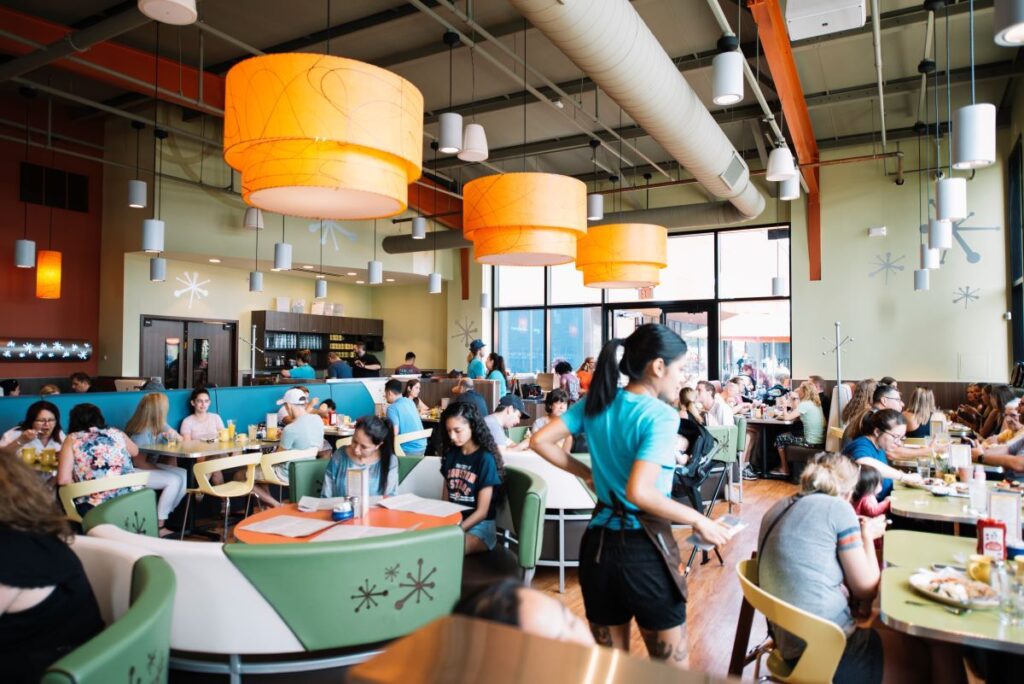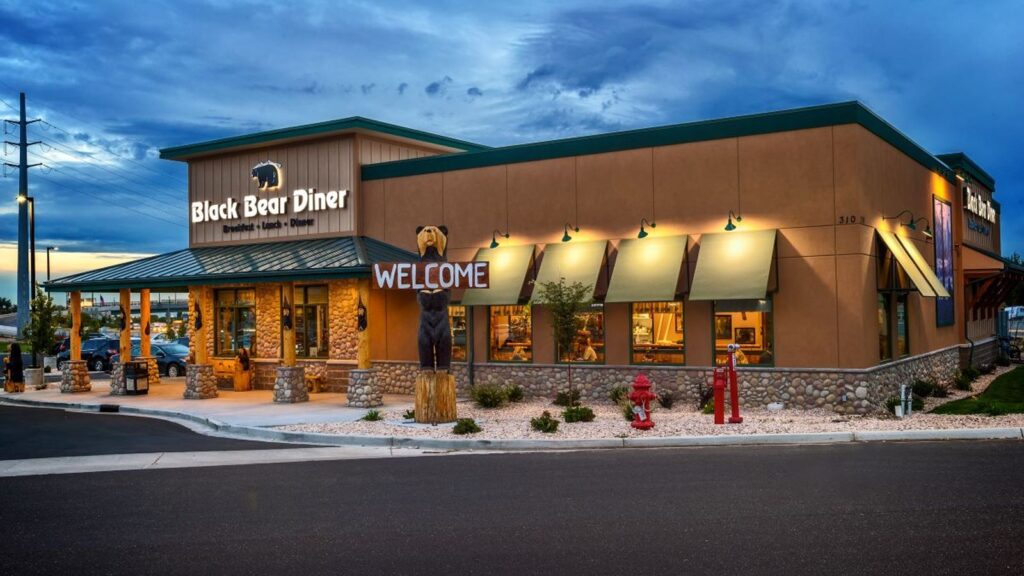Chains have adapted front- and back-of-house operations to accommodate more off-premise sales and technology to improve the dine-in experience.
By Julie Littman
March 22, 2023
This is the second in a three-part series looking at the growth of breakfast concepts. The first in the series focused on breakfast daypart trends.
Though breakfast concepts traditionally emphasized on-premise service, many chains are incorporating technology to improve the guest experience in the dining room and beyond. Black Bear Diner launched online ordering and third-party delivery in 2018. Following pandemic restriction in early 2020, the channel grew and makes up over 18% of sales today, CEO Anita Adams said.
To accommodate this strong off-premise sales mix, Black Bear invested in store design changes to ensure this channel didn’t disrupt its flow of operations. The company added a dedicated staging area in the front of house and a pickup window, allowing customers and delivery couriers to enter the foyer and grab food without having to enter the lobby or disrupt dine-in guests, Adams said.
In the back of house, Black Bear modified its kitchen display systems to route off-premise food separately from dine-in meals so on-premise guests weren’t queued behind off-premise orders. The chain offers the same menu across channels.
First Watch has recorded similar off-premise growth. Prior to 2020, the chain’s off-premise business made up less than 5% of its sales, but it now represents around 20%, CEO Christopher Tomasso said. To accommodate this growing business, First Watch created longer makelines for its kitchen and added dedicated pickup areas and windows, he said. The company is also installing double makelines to accommodate peak hours for off-premise and dining room business, Tomasso said during the company’s March earnings call.
Another Broken Egg’s off-premise business now accounts 12% of sales and is the company’s biggest driver of AUV growth, CEO Paul Macaluso said during the ICR Conference in January. Comparatively, off-premise made up only 2% of sales in November 2019. At that time, take out orders were processed via phone calls, but the restaurant added online ordering during the pandemic.

Tech bolsters efficiency, loyalty
Chains have also incorporated more technology to improve efficiencies and guest experience. This trend is in line with larger tech adoption among full-service restaurants. Forty-three percent of casual dining chains and 39% of family dining chains said they will adopt equipment to enhance the customer experience this year, according to the National Restaurant Association’s State of the Restaurant 2023 report. Technology adoption rates are slightly higher with back-of-house systems, as 46% of casual chains and 43% of family restaurants said they would add technology or equipment to improve these operations.
Another Broken Egg uses various technologies within its cafes, including a cloud-based point-of-sales system, a waitlist program and table tablets that can process orders, all of which help improve flowthru and table turns, Macaluso said.
First Watch uses a waitlist system as part of its front-of-house management tools, Tomasso said. The system allows the company to track consumer behavior in its dining rooms and increase seat utilization and table turns while reducing waitlist abandonment. Nearly 30% of its weekend traffic flows through the waitlist system, he said. The company also completed the rollout of a kitchen display system across its company-owned units last year, and will continue to optimize the platform, he said. The KDS will be a key driver of higher throughput, helping the chain scale to its goal of 2,200 domestic locations.
Snooze launched a loyalty program last April, and 5% of its transactions were tied to loyalty members at the start of 2023. Customers can redeem points for reservations on the weekend or receive unique food and beverage offerings unavailable on the regular menu, Long said. Snooze has spent the last year developing a catering platform. Working on menu items and growing that channel will be part of the company’s 2023 initiatives, Long said.
Snooze uses QR codes at the table, allowing guests to access menus and pay. It is evaluating the use of server handheld devices to process orders, Long said.
“Everything we do from a technology perspective is in support of a better guest experience whether that’s how quickly we’re able to take their order, how quickly we’re able to get their food to the table. The fact that food gets to the table hot and accurately. The fact that they don’t have to wait for a check or find their server to be able to pay when they’re ready.”
The San Antonio diner is now open at 2707 SE Military Drive and marks the second major Texas market Black Bear Diner has entered in two months, following the company’s first opening in the Dallas-Fort Worth area in Mesquite. The diner is a company-owned conversion build and boasts 5,713 square feet. It will seat up to 173 guests between its dining room and outdoor patio space. A second, franchise-owned San Antonio location is set to open in early 2023.
Black Bear Diner’s newest diner in Amarillo is located at 7000 E. Interstate 40, at a TA travel center. The new franchise-owned diner is a conversion build at an existing TA center and is located off exit 74 on Interstate 40. It will seat up to 113 guests within the 5,398 square foot space, and also features the brand’s new diner model, which includes a third-party pickup window located inside the vestibule of the restaurant. Both diners will be open daily from 6am-10pm.
Rounding out 2022, Black Bear Diner’s remaining planned openings include one corporate-owned diner in Harker Heights, TX, as well as a franchised location in El Paso, TX, at another TA location, bringing the company’s total diner openings for the year to 10. All new diners will be a combination of conversions and ground up builds and, where possible, will showcase the company’s new design enhancements that focus on building modifications to expedite off-premise business while preserving the in-diner guest experience.
Looking ahead to 2023, the company expects to open approximately 15 new diners system-wide, with a continued focus on expanding in the Lone Star State.
For more details on Black Bear Diner’s franchise opportunities visit www.blackbeardinerfranchise.com, and for more information on Black Bear Diner and its menu offerings visit www.blackbeardiner.com.
About Black Bear Diner
Black Bear Diner is one of the fastest-growing franchises in the country. Founded in 1995 by Bruce Dean and Bob Manley in Mt. Shasta, California, Black Bear Diner brings home-style comfort food classics and personal service to the dining experience. The quickly growing family dining concept, open for breakfast, lunch and dinner, offers a vast, enticing menu anchored in hearty portions and excellent value, with service rooted in genuine hospitality.
The franchise now operates 151 diners in 14 states and growing. Black Bear Diner has been consistently recognized for its significant growth and outstanding performance – Winner of FSR Magazine’s 2021 Reader’s Choice Award for Best Legacy Brand, Top 10 Customer Service Winner, Top 10 Fastest-Growing Chain and Top Disruptor from Nation’s Restaurant News. Franchise Times has called Black Bear Diner one of the “smartest-growing brands” in the country. The company is a disruptor in the family-dining segment for its growth and performance and will continue to focus on serving home-style comfort food classics and bringing personal service back to the dining industry as the brand continues to execute its expansion plan.
